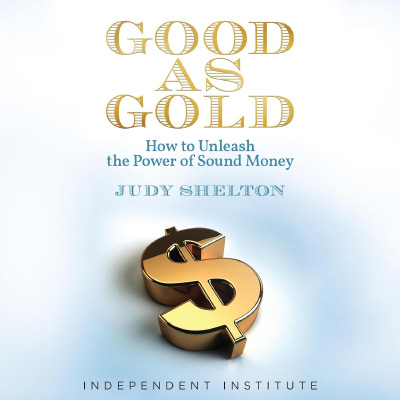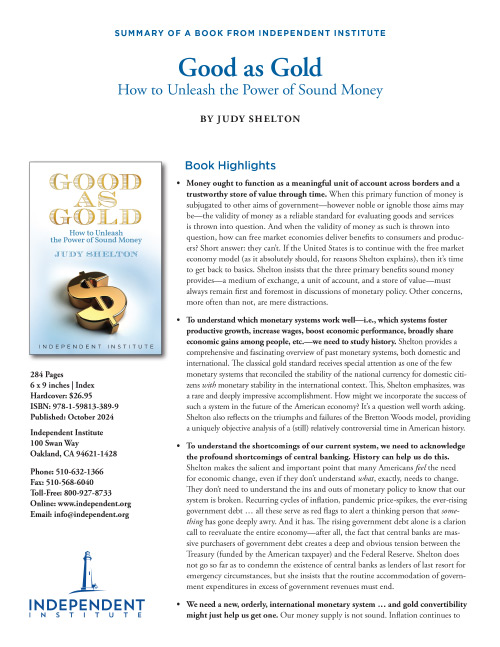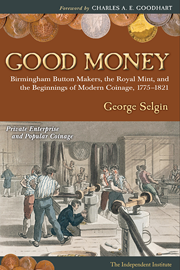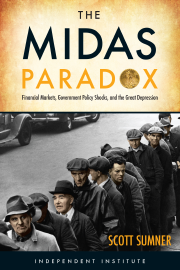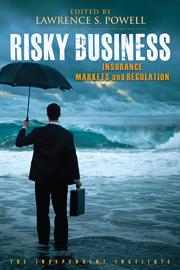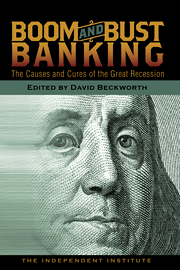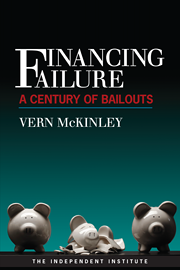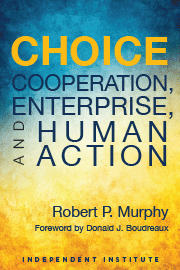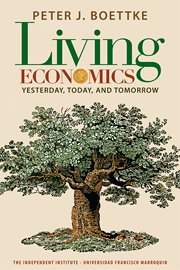Overview
From financial crises, to pandemic price-spikes, to recurring cycles of inflation, everyone agrees: the economy has seen better days.
But as soon as pundits and politicians start discussing economics, things get murky. Most books ask more questions than they answer.
Most books...but not this one.
Judy Shelton—Senior Fellow at Independent Institute, former Chairman of the National Endowment for Democracy, and critically acclaimed monetary economist—has written a book with answers.
And not a moment too soon.
With clarity and moral courage, Shelton charts the course to a brighter future. She’s one of the few economists bold enough to challenge the inflationary policies of the Federal Reserve, emphasizing how today’s policies enrich elites at the expense of—you guessed it—poor and middle-class Americans. This, Shelton insists, must end. And it can end—easily.
But Shelton doesn’t stop there. Her vision is for not only America but also for people around the world. Global, economic upliftment, she insists, need not come at the expense of domestic prosperity. We can have both—but not without a sound and stable U.S. currency.
And history is very clear on this point. When the U.S. dollar is backed by gold, America prospers, and so does the rest of the world. In this book, Shelton casts a powerful vision that is as revolutionary as it is time-tested...a vision that shows how the future American dollar can perform as good as gold...
...or even better.
But this is no curmudgeonly demand to return to the gold standard of yore. Neither is it a demand to return to the Bretton Woods era. Instead, Shelton offers something new: an explanation of how we can use gold for a new international monetary order. Step by step, she lays out how gold can provide a universal measure of value across borders, create new financial opportunities, and dramatically increase prosperity around the world.
If you care about the poor, rich, and everyone in between, you have to read this book ... and discover:
- how price stability functions as the foundation for productive economic growth;
- how political freedom and economic freedom are fundamentally linked ... and how one cannot exist without the other;
- how to reconcile the stability of America’s domestic currency in a global context;
- the proper role of government in the economy;
- and much, much more ...
Writing with a sober but hopeful voice, Shelton is no ordinary economist. With grace, intellectual rigor, and unmatched passion, this book is a must-read for anyone invested in the future of the American—and global—economy. You'll walk away with more answers than questions—a rare experience for anyone who reads about monetary policy.
Contents
Preface
Introduction
Part One: Building Consensus
- Central Planning Doesn’t Work
- Stable Money Fosters Productive Growth
- Money Should Work Across Borders
Part Two: Taking Action
- Fix What Broke
- Golden Link to the Future
- The Leadership Imperative
Epilogue
Notes
Index
About the Author
Detailed Summary
- Money ought to function as a meaningful unit of account across borders and a trustworthy store of value through time. When this primary function of money is subjugated to other aims of government—however noble or ignoble those aims may be—the validity of money as a reliable standard for evaluating goods and services is thrown into question. And when the validity of money as such is thrown into question, how can free market economies deliver benefits to consumers and producers? Short answer: they can’t. If the United States is to continue with the free market economy model (as it absolutely should, for reasons Shelton explains), then it’s time to get back to basics. Shelton insists that the three primary benefits sound money provides—a medium of exchange, a unit of account, and a store of value—must always remain first and foremost in discussions of monetary policy. Other concerns, more often than not, are mere distractions.
- To understand which monetary systems work well—i.e., which systems foster productive growth, increase wages, boost economic performance, broadly share economic gains among people, etc.—we need to study history. Shelton provides a comprehensive and fascinating overview of past monetary systems, both domestic and international. The classical gold standard receives special attention as one of the few monetary systems that reconciled the stability of the national currency for domestic citizens with monetary stability in the international context. This, Shelton emphasizes, was a rare and deeply impressive accomplishment. How might we incorporate the success of such a system in the future of the American economy? It’s a question well worth asking. Shelton also reflects on the triumphs and failures of the Bretton Woods model, providing a uniquely objective analysis of a (still) relatively controversial time in American history.
- To understand the shortcomings of our current system, we need to acknowledge the profound shortcomings of central banking. History can help us do this. Shelton makes the salient and important point that many Americans feel the need for economic change, even if they don’t understand what, exactly, needs to change. They don’t need to understand the ins and outs of monetary policy to know that our system is broken. Recurring cycles of inflation, pandemic price-spikes, the ever-rising government debt ... all these serve as red flags to alert a thinking person that something has gone deeply awry. And it has. The rising government debt alone is a clarion call to reevaluate the entire economy—after all, the fact that central banks are massive purchasers of government debt creates a deep and obvious tension between the Treasury (funded by the American taxpayer) and the Federal Reserve. Shelton does not go so far as to condemn the existence of central banks as lenders of last resort for emergency circumstances, but she insists that the routine accommodation of government expenditures in excess of government revenues must end.
- We need a new, orderly, international monetary system ... and gold convertibility might just help us get one. Our money supply is not sound. Inflation continues to drive up prices, and the American dollar is becoming less trustworthy by the day in the world’s marketplace. Under these shamefully bad conditions, utilizing gold as part of a new international monetary order should not be off the table. Bonds convertible into gold at a fixed price might just be the catalyst for stable exchange rates, a universal benchmark of value, accurate price signaling across and within borders, and even new financial investment opportunities. The unfashionable reputation of “goldbugs” in monetary circles should not dissuade us from considering workable solutions.
- America’s monetary system will not improve without bold political leadership. Throughout her book, Shelton insists that economic freedom is inextricably linked to political freedom. After all, the fruits of free market capitalism can only be enjoyed by citizens with the liberty to enjoy them in the first place. America must seize this opportunity for bold political leadership. The time has come for someone to forge the path toward America’s restored money unit. Our status as a shining city on a hill depends on it, and our aim should be nothing less than to make the U.S. dollar the most trustworthy currency in the world.
From financial crises, to pandemic price-spikes, to recurring cycles of inflation, everyone agrees: the economy has seen better days. But as soon as pundits and politicians start discussing economics, things get murky. Most books ask more questions than they answer. Except this one. Judy Shelton—senior fellow at Independent Institute, former chairman of the National Endowment for Democracy, and critically acclaimed monetary economist—has written a book with answers, and not a moment too soon.
With clarity and moral courage, Shelton charts the course to a brighter future. She’s one of the few economists bold enough to challenge the inflationary policies of the Federal Reserve, emphasizing how today’s policies enrich elites at the expense of poor and middle-class Americans. This, Shelton shows, can end—easily. Good as Gold is an inspiring message of hope not only for Americans but for people around the world. Global economic prosperity, she insists, does not need to come at the expense of domestic prosperity. We can have both—but not without a sound and stable U.S. currency.
Shelton shows that history is very clear on this point. When the U.S. dollar is backed by gold, America prospers, and so does the rest of the world. In this book, Shelton casts a powerful vision that is as revolutionary as it is time-tested—a vision that shows how the future American dollar can perform as well as gold, or even better. But this is no curmudgeonly demand to return to the gold standard of yore; neither is it a demand to return to the Bretton Woods era. Instead, Shelton offers something new: an explanation of how we can use gold for a new international monetary order.
This book makes time-tested economic truths accessible, interesting, and vital to readers. How does price stability function as the foundation for productive economic growth? How are political freedom and economic freedom fundamentally linked ... and can one possibly exist without the other? How can we reconcile the stability of America’s domestic currency in a global context? What’s the proper role of government in the economy? With grace, intellectual rigor, and unmatched passion, this book is a must-read for anyone invested in the future of the American—and global— economy.
What doesn’t work?
What does it mean for an economy to function optimally? A good place to start is to examine what success does not look like.
One of the most profound and important historical examples of economic failure is the Soviet Union’s central planning system, which ended in internal bankruptcy and political collapse. As it turns out, lofty rhetoric and noble dreams of “equality” aren’t enough to make a fair and functional economy.
Why, then, do we allow central banks in America to control the price of loanable funds and influence credit marks in pursuit of the government’s economic objectives? Why does such a small committee of unelected officials on the board of the Federal Reserve control the money supply? The collapse of the Soviet Union taught us that this kind of economic system leads to disaster. Are we willing to embrace the same fate? If not, then Shelton argues it’s time to wake up.
Another important metric of economic failure or success is economic growth. But, Shelton insists, “economic growth” is a term that must be carefully and intentionally defined. Gross domestic product (GDP) is only a starting point; it doesn’t tell the full story. Other factors such as life expectancy, well-being, and ecological footprint deserve consideration. We also must ask: Does it matter if economic growth happens in the financial sector versus manufacturing or service-oriented pursuits? In America today, the former seems to yield great fruit; hedge fund managers, investors, and stock market brokers make millions on billions of dollars working in the financial sector. Inevitably, this leads to an excessive financialization of the economy—at the expense of other sectors. “Speculative investing in financial markets that seek to profit from the monetary and exchange rate instability caused by central bank decisions may generate high incomes, but it doesn’t increase the size of the economic pie,” Shelton writes.
Shelton argues that the productive output of a nation is an equally (if not more) important measurement of economic growth. While the profits from practices like currency trading may count toward America’s GDP on paper, they do not constitute productive output. There is a stunning disconnect between real economic growth and the growth of financial assets.
What does work?
The first and most important ingredient for good economic activity and true productive growth, Shelton writes, is stable money. If we want to consider ourselves part of the global economy, then “stable” money must mean money that measures value across borders and through time. Only when money does both these things can it provide stable purchasing power to rich and poor people alike.
Shelton writes that the classical gold standard and the Bretton Woods system, both of which linked money and gold, achieved these goals. They weren’t perfect systems (no system is perfect), but they got the job done.
Under the classical gold standard, there was scarcely a difference between money and gold. Gold’s metallic value has always been (and remains today) incredibly high. In fact, the reason modern gold coins are almost never used in daily transactions today is precisely because their metallic value is so much higher than the nominal value printed on the surface. Clearly, gold is valuable. Even those whose livelihoods depend on the central planning system, like former Federal Reserve chairman Ben Bernanke, know this. Indeed, Bernanke, who famously dismissed concerns over the dollar’s value as “overstated” in 2011, acknowledged that the gold standard “did deliver price stability over very long periods of time” in a hearing before the Committee on Banking, Housing, and Urban Affairs in the United States Senate. Now, even more than in 2011, price stability over “very long periods of time” seems like a very worthy goal.
Under the Bretton Woods system, fixed exchange rates between nations were enforced to bring order to international trade and investment. The idea was to prevent currency depreciation from being used by cheating nations to skew financial outcomes to their own advantage. It was, for a time, enormously successful.
The architects of Bretton Woods insisted on the enforcement of stable exchange rates precisely because they recognized the need to prevent currency wars from becoming real wars. That was wise. Shelton warns that precious few of today’s economic leaders have such existential concerns on their radar.
There are very real threats to America’s liberty and status on the world stage and in the world’s marketplace. They ought to spur us from the world of theory to the world of action.
From theory to action
Part One of Shelton’s book works to build the necessary intellectual consensus to provide the groundwork for implementing an innovative approach for a new monetary future. In light of the lessons she presents from the distant and not-so-distant past, we can move from the world of theory to the world of action. We can address the shortcomings of our own system and create a new one that works for all Americans.
To start, Shelton recommends launching new Treasury Trust Bonds—George Gilder calls them “Shelton bonds”—to move toward sound money and away from economic management through central bank intervention. “The dollar is made as good as gold by pledging gold convertibility of a Treasury bond at maturity with a nominal face value defined in dollars,” Shelton writes. Such bonds would “signal a new commitment to fiscal and monetary accountability by offering an official debt instrument backed by the United States government that reaffirms gold convertibility for the first time since the Bretton Woods system was dismantled.” She also recommends that the president under whose leadership this initiative be launched appoint a commission to investigate ways to set a fixed value for the dollar—another important way America’s economy would earn public trust.
Shelton’s sphere of action extends beyond the borders of the U.S. The entire world, she argues, ought to be concerned with international monetary reform. How could an American leader help make this happen? To start, Shelton recommends going up against the International Monetary Fund (IMF), which claims to work “to achieve sustainable growth and prosperity for all of its 190 member countries.” An American leader should demand an explanation for the IMF’s transformation away from its founding responsibility (to “safeguard exchange rate stability”) and declare that the organization has outlived its purpose. “Indeed,” writes Shelton, today the IMF actually “works against leveling the international monetary playing field. If the IMF were true to its mission espoused by its architects to bring about financial disarmament by preventing beggar-thy-neighbor currency depreciation from undermining trade, it would facilitate a move toward a new international monetary order based on gold convertibility for a class of long-term government debt instruments issued by participating nations using their own currencies.” Of course, for political and ideological reasons, the IMF would do no such thing today ... despite holding over 90 million ounces of gold itself.
Holding so much, the IMF sees the value of gold; it even notes on its website that “gold remains an important reserve asset.” But when it comes to action—e.g., actually confronting disorderly currency movements—the IMF remains shamefully paralyzed. America must not follow suit.
The necessity of political leadership
Shelton emphasizes the declining faith American people place in their economic leaders. In a May 2023 Gallup poll, Federal Reserve Chairman Jerome Powell received the lowest Gallup rating for any prior Fed chair, with only 36 percent of Americans expressing confidence that he would do or recommend the right thing for the economy. Change is needed—and clearly, Americans are ready for it.
But fighting for change means fighting the Federal Reserve, the status quo, and the years of inertia that have paralyzed most of Washington’s leadership class. That is not a mission for the faint of heart. Shelton warns that none of the work or recommendations in her book will bear fruit without one indispensable resource—political leadership.
The next generation of American leaders must rise to the challenge of sound money. And they must heed Shelton’s urgent words: “The solution to providing sound money at home and abroad is to link the value of the dollar once again to gold—not all at once, not overnight. But to bring clarity of purpose to the need to restore faith in our currency as an honest measure, a dependable store of value and to reinforce the integrity of the U.S. dollar as the most trustworthy currency in the world.” The next great American leader must insist that money is a moral contract between the government and its citizens. This will restore confidence in the basic competence of America’s government in terms of both monetary and fiscal policy. A confident and visionary leader will recognize that “establishing a stable monetary foundation for achieving optimal economic performance—and granting access to participating trade partners willing to abide by its tenets—would serve as a testimonial to free markets and free people.”
Shelton sets the bar for the American economy high. But high does not mean impossible. A stable dollar that provides a reliable measurement tool for making decisions about the future is not a pipe dream. “A skilled political leader will comprehend the powerful appeal of putting forth the question that is treated with belittlement by central bankers while strongly registering with people who must contend daily with the real economy: Why not sound money?”
It’s past time to make the U.S. dollar the most trustworthy currency in the world—to make it good as gold.
Praise
“In her book Good as Gold, Judy Shelton explains what was lost after the gold-backed Bretton Woods system was abandoned by the Nixon administration. Stable money is a pillar of the supply-side agenda for achieving productive economic growth. We need a dollar that is a world currency, that’s for sure—one that provides a reliable store of value at home and is recognized as the world’s most respected monetary standard for international trade and investment. Judy Shelton shows us how to achieve both.”
—Arthur B. Laffer, Ph.D.
“A book more than worth its weight in gold. Shelton obliterates the wrong-headed, opportunity-killing ideas that currently have a vice-like grip on central bankers and economic policymakers. Then she lays out a new way forward to achieving sound money—the absolute requisite for a genuinely prosperous, free-market future. A masterful achievement.”
—Steve Forbes, chairman and editor-in-chief, Forbes Media
“In 1997, Judy Shelton’s mentor, the Nobel laureate Robert Mundell, proclaimed that ‘gold will be part of the international monetary system in the twenty-first century.’ In a clear and persuasive way, Shelton’s Good as Gold provides a road map for the United States to follow, leading the way to Mundell’s promised land.”
—Steve H. Hanke, professor of applied economics, Johns Hopkins University
“Judy Shelton’s brilliant plan for the redemption of the U.S. dollar couldn’t be timelier. A 24-karat broadside in the service of sound money, world prosperity, and—who dreamt it was possible?—the ennoblement of American politics.”
—James Grant, publisher, Grant’s Interest Rate Observer

